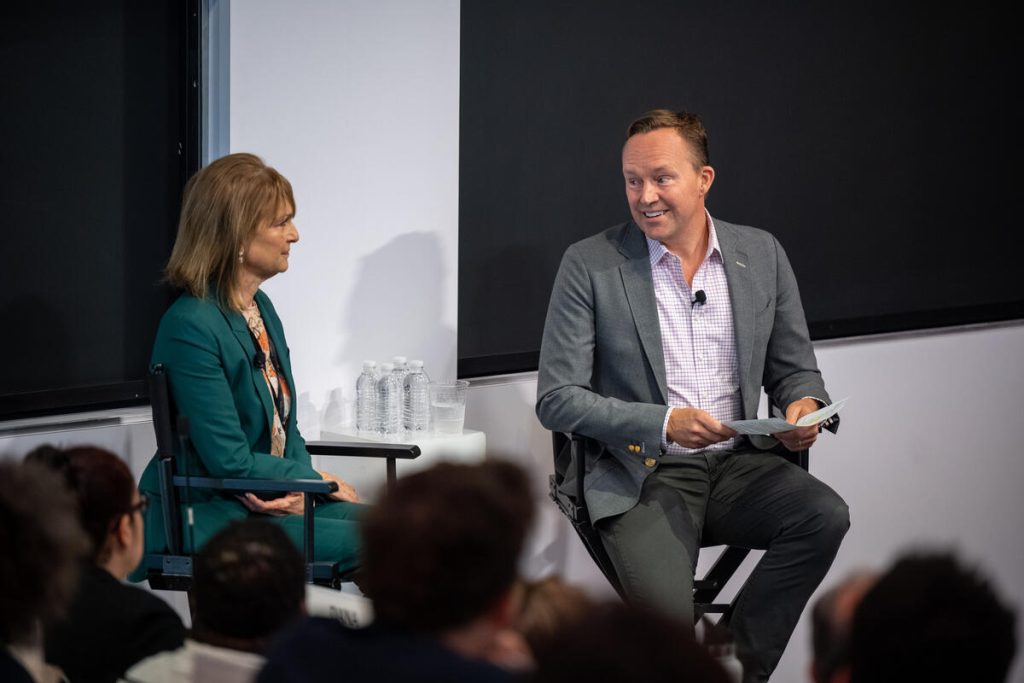From expanding our efforts to strengthen local leadership to Israel, to launching the Bloomberg Initiative for Cycling Infrastructure at CityLab, our Government Innovation team accomplished a lot in 2022. To reflect on their success, discuss what inspires their work, and how they’ll carve a path forward in this new year, we welcome James Anderson, who leads the Government Innovation program.
Bloomberg Philanthropies’ Government Innovation program works to help cities bring bold ideas to life and spread proven solutions to the most pressing and complex problems faced by cities around the world.

1. What accomplishments from your program area are you most proud of in 2022?
When we started the Bloomberg Harvard City Leadership Initiative in 2016, we knew we were addressing an unmet need. Mayors were often entering office without the management skills and support networks they needed to master one of the toughest jobs around. That initiative has had significant impact and reach: Today, one-third of U.S. cities with 100,000+ populations are led by a Bloomberg Harvard participant.
I’m excited that we’ve now started scaling these efforts globally. In 2022, we launched the Bloomberg-Sagol Center for City Leadership at Tel Aviv University, which is focused on strengthening local leadership across Jewish, Arab, and ultra-Orthodox communities throughout Israel. And just this month, we partnered on the inaugural AMALI City Leadership Forum, a program for mayors across Africa that was created by the University of Cape Town’s African Centre for Cities and Big Win Philanthropy. We’re looking forward to additional opportunities in the year to come.
2. What was something that inspired or influenced your work this past year?
I’m especially inspired by dramatic shifts in Washington, D.C.— reflected both in the White House’s deepened respect for the role local governments can play in solving our country’s biggest problems and in Congress’ seismic drive to fund local solutions from the bottom up. From the $1.9 trillion American Rescue Plan to the $1.2 trillion bipartisan Infrastructure Investment and Jobs Act, the $52.7 billion CHIPS and Science Act, and the $700 billion Inflation Reduction Act, we’re seeing a historic move away from the “Congress knows best” mentality toward an understanding that the most innovative solutions are often found in cities and counties across America.
While it’s now imperative that local leaders step up, we know that their capacity to do so is mixed, at best. That’s why Bloomberg Philanthropies brought together partners across philanthropy, academia, and the nonprofit sector to build the Local Infrastructure Hub, a support center designed to help cities navigate new funding streams and advance ambitious grant proposals.
3. What are you looking forward to in 2023?
It’s energizing to see the increasing number of ways cities are exchanging insights and solutions with each other. I recently overheard the Chief Heat Officer of Los Angeles sharing policy tips with the Innovation Lead for the desert city of Eilat, Israel. And Guadalajara’s 2016 Mayors Challenge-winning idea, to reduce corruption in permitting processes, has now been adopted in 40 additional cities. Meanwhile, mayors with the shared challenge of police shortages are taking to the Bloomberg Harvard listserv to swap recruitment and retention strategies. The networks Mike Bloomberg’s been building for the past two decades are maturing and enabling ideas, big and small, to move quickly between cities.
4. What are some trends or challenges you believe we’ll see in the year ahead?
A growing number of thought leaders and organizations are waking up to the fact that we can’t address the climate crisis, pandemic recovery, inclusive growth—you name it—without an effective public sector and fit-for-purpose public institutions. It’s exciting to see this conversation become more mainstream because, after decades of devaluing public service and disinvestment, there’s significant strategic capacity we need to rebuild. This year, we’ll partner with economist Mariana Mazzucato and her team at University College London to begin delineating the critical capacities that contemporary public institutions need to get the job done.
5. What is a piece of media you consumed this past year that you would recommend our readers check out in 2023?
I was fortunate to get a first look at Jennifer Pahlka’s new book, Recoding America: Why Government Is Failing in the Digital Age and How We Can Do Better, which comes out in June. Jen, who was President Obama’s deputy chief technology officer and founded Code for America back in 2010, compellingly documents the cultural, regulatory, and political barriers to creating a public sector that’s nimble and responsive. It’s an important read and one I highly recommend!
Read more in the series:
5 End-of-Year Questions for Dr. Kelly Henning on Public Health
5 End-of-Year Questions for George Fertitta on Helping Cities Thrive
5 End-of-Year Questions for Antha Williams on Protecting the Planet
5 End-of-Year Questions for Brynne Craig on Responding to Urgent Needs Head On
5 New Year Questions for Jemma Read on Bloomberg’s Commitment to Giving Back